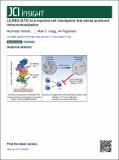LILRB3 (ILT5) is a myeloid cell checkpoint that elicits profound immunomodulation
Author(s)
Yeboah, Muchaala; Papagregoriou, Charys; Jones, Des C; Chan, HT Claude; Hu, Guangan; McPartlan, Justine S; Schiött, Torbjörn; Mattson, Ulrika; Mockridge, C Ian; Tornberg, Ulla-Carin; Hambe, Björn; Ljungars, Anne; Mattsson, Mikael; Tews, Ivo; Glennie, Martin J; Thirdborough, Stephen M; Trowsdale, John; Frendeus, Björn; Chen, Jianzhu; Cragg, Mark S; Roghanian, Ali; ... Show more Show less
DownloadPublished version (8.517Mb)
Publisher with Creative Commons License
Publisher with Creative Commons License
Creative Commons Attribution
Terms of use
Metadata
Show full item recordAbstract
Copyright: © 2020, Yeboah et al. This is an open access article published under the terms of the Creative Commons Attribution 4.0 International License. Despite advances in identifying the key immunoregulatory roles of many of the human leukocyte immunoglobulin-like receptor (LILR) family members, the function of the inhibitory molecule LILRB3 (ILT5, CD85a, LIR3) remains unclear. Studies indicate a predominant myeloid expression; however, high homology within the LILR family and a relative paucity of reagents have hindered progress toward identifying the function of this receptor. To investigate its function and potential immunomodulatory capacity, a panel of LILRB3-specific monoclonal antibodies (mAbs) was generated. LILRB3-specific mAbs bound to discrete epitopes in Ig-like domain 2 or 4. LILRB3 ligation on primary human monocytes by an agonistic mAb resulted in phenotypic and functional changes, leading to potent inhibition of immune responses in vitro, including significant reduction in T cell proliferation. Importantly, agonizing LILRB3 in humanized mice induced tolerance and permitted efficient engraftment of allogeneic cells. Our findings reveal powerful immunosuppressive functions of LILRB3 and identify it as an important myeloid checkpoint receptor.
Date issued
2020Department
Koch Institute for Integrative Cancer Research at MIT; Massachusetts Institute of Technology. Department of BiologyJournal
JCI Insight
Publisher
American Society for Clinical Investigation